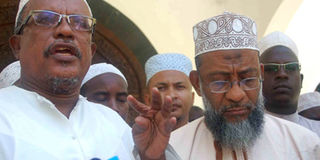Uneasy calm returns to Mombasa as leaders condemn deadly violence

PHOTO / GEROGE KIKAMI Supkem chairman Coast region Muhdhar Khatarmy Sharrif (left) and and CIPK secretary-general Sheikh Mohammed Dor address the Press in Mombasa on October 5, 2013 where they blamed the government for shooting and killing youth who were rioting on October 4.
What you need to know:
- Nyali MP Hezron Awiti Bollo and his Mvita counterpart Abdulswamad Shariff Nassir condemned the violence and urged police to arrest those who may have instigated it
- Christian leaders challenged the government and Muslim colleagues to explain why their members and churches were targets of Muslim rioters
An uneasy calm returned to Mombasa on Saturday following clashes Friday between protestors and police that left four people dead and at least seven with serious injuries.
Muslim, Christian and political leaders roundly condemned the violence, calling for calm and a speedy resolution of the cold-blooded killing the previous night of a cleric and three others that provoked the violent protests.
Masjid Musa Mosque cleric Sheikh Ibrahim Umar Ismail, popularly known as Rogo or Logo, was killed together with three companions as they returned home late on Thursday evening.
The deaths sparked violent protests in which the four people died as the youths clashed with anti-riot police.
On Saturday, many business premises, shops, bookstores and cafes that had closed on Friday were opened, but cautious owners stayed on the lookout for any signs of trouble.
Police remained on high alert patrolling the sprawling suburbs especially Majengo ya Musa, King’orani, Mwembe Tanganyika, Majengo Ropa, Majengo Sokoni, Burnley and Majengo ya Mvita.
Mombasa County police boss Robert Kitur sought to reassure residents and told them to go about their business without fear.
“Things are back to normal and people should go about with their daily businesses although we are not taking chances when it comes to security,” he told the Sunday Nation on the phone.
According to the officer, those who started chaos in Kisauni were thugs who wanted to create an opportunity to loot and rob innocent people.
CHURCH TORCHED
Contingents of anti-riot police kept vigil around Masjid Musa Mosque, the epicentre of the violence, where hooded youths torched a facility in the nearby Salvation Army church on Friday.
Muslim clerics distanced themselves from the arson.
“Whilst we reiterate our condemnation of the Westgate massacre, we are also appalled by the violence which broke out in the aftermath of the extra-judicial killings of four Muslim preachers on Thursday and the uncalled-for attacks on a church and private properties,” the leaders said in a statement read by Supreme Council of Kenya Muslims secretary-general Adan Wachu. They asked the government to launch investigations into both incidents.
“Those behind the burning of the Salvation Army church are criminals who have no respect for religion. Islam does not approve of such heinous behaviour,” said Mr Wachu at a press briefing at Jamia Mosque, Nairobi. Human rights activist Al Amin Kimathi called for the speedy conclusion of investigations into the killings.
Mombasa leaders joined the clergy in condemning the killings. Nyali MP Hezron Awiti Bollo and his Mvita counterpart Abdulswamad Shariff Nassir condemned the violence and urged police to arrest those who may have instigated it.
“These youth want to portray a picture that the matter is between Muslims and Christians when it is not. Muslims and Christians are not fighting because they are brothers. This violence is instigated by only a few criminal elements who have nothing to do with Islam,” said Mr Bollo at a press conference at Mamba Village, Mombasa.
“Whether committed by a Muslim or by a Christian, a crime is a crime. Let individual people take the responsibility and not drag in religion.”
Mr Awiti urged the government to address general insecurity, especially in Nyali constituency where illegal drugs are on sale “in broad daylight”.
Nominated Senator Emma Mbura urged security organs to improve their operations. “Whatever their sins, the four victims were citizens of the Republic of Kenya, and the State had the duty and the means to protect their lives and their right to due process, but it did not. If the four had violated any local or international laws, they ought to have been arrested and accorded a fair trial. I demand that the relevant State authorities demonstrate in no uncertain terms that they are already on top of this case,” said Ms Mbura.
Similar calls were made by clergy from the Supreme Council of Kenya Muslims, the Council of Imams and Preachers of Kenya, Anglicans, Catholics and other denominations.
“This problem of senseless killings, burning of churches, looting of shops and properties, and harming of innocent people does not conform to Islamic teachings,” said CIPK secretary-general Sheikh Mohamed Dor.
On the other hand, Christian leaders challenged the government and Muslim colleagues to explain why their members and churches were targets of Muslim rioters.
Reading a joint statement yesterday, Mombasa Anglican Church of Kenya Bishop Lawrence Dena noted that in both Majengo and Westgate, Christians had been targeted.
“We are asking the government and Muslim leaders to explain why Christians are being put under attack as witnessed both in the Westgate and Majengo attacks,” they said.
Additional reporting by Jeremiah Kiplang’at and Daniel Nyassy




